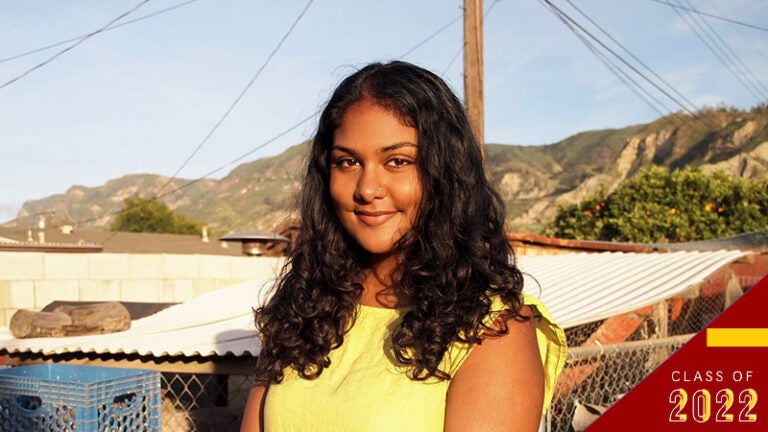
Graduating anthropology major discovers a deeper sense of self and purpose at USC Dornsife
Hameedha Khan arrived at the USC Dornsife College of Letters, Arts and Sciences in August 2018 nervous and uncertain.
As a first-generation college student from Memphis, Tennessee, Khan centered her attention on navigating college life and providing for herself, a single-minded focus overpowering any earnest reflection on what she hoped to extract from her undergraduate experience.
“I really didn’t know what I wanted to do with myself,” Khan admits.
During her second year, however, Khan took a seat in Associate Professor of Comparative Literature Neetu Khanna’s class, and everything changed.
Exposed to scholars like Frantz Fanon and Ania Loomba, Khan encountered new perspectives to attack longstanding questions. Even more, Khanna’s presence at the front of the room — Khan’s first female professor of color at USC — altered Khan’s academic trajectory.
“I began to see a space for myself in academia, and one where maybe I could one day contribute to these life-shaping conversations,” Khan says.
Shaking the unease that blanketed her opening year at USC, Khan marched through her remaining undergraduate years with a defined purpose and clear vision. She prioritized taking classes outside her anthropology major, particularly those taught by women of color, to capture a wider lens of the world. She tossed herself into extracurricular activities that nourished her exploding curiosity. And, she landed a prestigious Mellon Mays Undergraduate Fellowship.
“Over the past four years, I gained a lot of clarity on who I am and who I hope to become,” Khan says.
Developing a sense of self
Khan came to USC Dornsife open to any career that might enable her to contribute something meaningful to the world. Though she confesses she didn’t know what anthropology was as a high school student, the idea of exploring different cultures and cultural practices intrigued.
“There’s a lot we can learn from each other as humans,” Khan says.
Anthropology also afforded Khan an opportunity to reflect on her own cultural background as a Tamil Muslim woman. As she progressed in her studies and tackled independent research, Khan developed deeper insights into her own ancestry — and did so on her own terms, savoring ethnographic methods that focused on the knowledge and experiences of everyday people rather than the state-sponsored or colonial sources that so often failed to share a full, accurate picture.
“Anthropology has given me the opportunity to learn and explore myself rather than having things dictated to me,” she says.
Khan’s self-discovery occurred outside of the classroom, as well.
She worked with South Asian anti-caste organizing circles to lead discussions about the pitfalls of social class stratification and completed a movement journalism fellowship with The Blueprint, an online publication sharing the stories of caste-oppressed and religious minority groups in South Asia and the diaspora.
“Engaging with other young South Asian writers enriched my sense of community and taught me the power of giving a platform to those from marginalized communities to share their stories,” Khan says.
Work-study jobs with USC Dornsife’s Levan Institute for the Humanities, where she helped edit the Social Justice Review, the Department of Latin American and Iberian Cultures, and Jumpstart USC, an early childhood education program, further broadened Khan’s outlook while allowing her to pay for school.
“I was constantly learning, exploring and discovering,” she says.
Charging ahead
Khan’s enterprising spirit was recognized last year when the Dean’s List mainstay earned a coveted spot in the prestigious Mellon Mays Undergraduate Fellowship Program, a nationwide initiative designed to diversify higher education’s faculty ranks.
As a Mellon Mays fellow, Khan is researching the effects of Hindu Nationalism and fascism in India on Muslims, which includes a close examination of Tamil Muslim women’s identity and cultural belonging amid globalization and state violence.
She has conducted phone interviews and participated in a WhatsApp group chat with Tamil Muslim women in India to gain real-world insights that she can use when she travels to Tamil Nadu, India, this summer to record family stories and folk tales.
“It’s important we take control and power over our own narratives, and equally important I stay grounded in my research and understand the social moment,” says Khan, who also earned USC Discovery Scholar honors.
Lanita Jacobs, Khan’s Mellon Mays research advisor and, Khan says, a consistent source of inspiration and encouragement, praised Khan’s intellectual curiosity and collegiality.
“I am utterly heartened that Hameedha invests in her studies and community in such a deep and committed way. She is kind, smart, wise and knows her way to and through theory,” says Jacobs, associate professor of American studies and ethnicity and anthropology.
Khan says the Mellon Mays fellowship is providing her the mentorship and motivational support she needs to pursue a career in academia, a goal she first set while sitting in Khanna’s comparative literature course years ago. This fall, Khan will begin applying to PhD programs in ethnic studies hoping to launch an interdisciplinary career in academia that blends teaching, research and writing.
“It took some meandering, but I’ve found a strong voice and direction for myself,” Khan says. “I’m more confident, more assertive and know that what I have to say is important.”